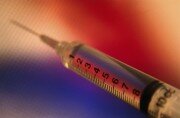Men Are At Greater Risk Of Heart Disease And Cancer
It’s national Men’s Health Week and even though we speak about many health concerns here at The Daily Health we seldom speak about men’s health specifically.
Recognising and preventing men’s health problems is not just a man’s issue. Its impact on wives, mothers, daughters, and sisters make men’s health truly a family issue. National Men’s Health Week is a golden opportunity to focus on men’s health and to create awareness of men’s health issues as well as support men in making healthier choices. Please share this alert with the men in your life and support them to take charge of their own health.
The weaker sex…
Traditionally men have always been expected to ‘rough it out’ when they are feeling unwell and are known to be more ‘stiff upper lip’ and not being as health-conscious as women. But statistically this has resulted in a negative impact on men’s health in general.
Forty per cent of men die before the age of 75 and in some parts of the country, average male life expectancy lingers in the mid 60s. Men develop heart disease on average 10-15 years before women and are twice as likely to develop and die from the 10 most common cancers affecting both sexes (excepting breast cancer, which is rare in men).
The economic downturn and looming recession also has a dramatic impact on men’s mental health. One in seven men who are unemployed will develop depression within six months of losing their jobs and there is a real concern that the recent fall in the male suicide rate will be reversed. There is also evidence that unemployment impacts on men’s physical health, with more deaths from cancer, accidents and violence.
Women’s health will suffer too of course, but men’s health is more sharply affected by social deprivation. This is probably because men tend to lack the social networks that offer some protection against the stress of job insecurity, unemployment and poverty. Work is still central to male identity and many men feel its loss acutely – yet they are frequently reluctant to discuss this or other worries.
Higher cancer mortality among men
According to a report published this week by the National Cancer Intelligence Network (NCIN) and Cancer Research UK together with the Men’s Health Forum, men are almost 40 per cent more likely than women to die from cancer and 16 per cent more likely to develop cancer in the first place.
Health experts suggest that a possible explanation for the differences seen for some types of cancer could be down to stereotypical male behaviour – like downplaying important early symptoms and having an unhealthy lifestyle.
Professor David Forman, information lead for the NCIN, said: “For many of the types of cancer we looked at that affect both sexes, there’s no known biological reason why men should be at a greater risk than women, so we were surprised to see such consistent differences.”
“The evidence shows that men are generally not aware that, as well as smoking, carrying excess weight around the waist, having a high alcohol intake and a poor diet and their family history all contribute to their increased risk of developing and dying prematurely from cancer, but more research needs to be done before we can be sure exactly why this gender gap exists.” said Professor Alan White, Professor of Men’s Health at Leeds Metropolitan University.
Of course, these figures are a major concern and it shows that a concerted effort needs to be made into getting men more aware of the health risks they are facing. Many of these deaths can be avoided by changes in lifestyle and earlier diagnosis. There is no reason why this message should be falling on deaf ears for men.
Simple Changes
One of the quickest ways to get your health back on track is to make simple healthy lifestyle changes. Men are often big meat eaters, but high fat animal proteins are often implicated in cancer, diabetes and heart disease. To keep fat and cholesterol down, proteins like beans and legumes, fish and poultry are better choices.
In the same sense, men and boys are not always that keen to eat their veggies, but eating a variety of vegetables and fruits helps protect against cancers by increasing levels of beta carotene, lutein and vitamin C in the blood. The high fibre content in fruit and vegetables helps prevent cardiovascular disease, Type 2 diabetes and digestive problems. Fibre also helps men control their weight by filling them up and not out. Aim for about 35 grams of fibre for 2,500 calories.
5 Veggies You Should Be Eating
For optimum health and a good balanced vegetable intake, keep your kitchen stocked with vegetables that cover the whole spectrum of colours, including the following:
- Onions: This classic vegetable adds flavour to any meal. Allicin, a phytonutrient found in most varieties of onions, may be responsible for its health benefits, including lowering cholesterol and blood pressure.
- Garlic: Contains many of the same phytonutrients as onions, as well as antibiotic and antiviral compounds. It may help boost the immune system, prevent colds, lower blood pressure and cholesterol, and fight fungal or yeast infections.
- Spinach: This dark leafy green (and others like it, such as kale and collards) contains lutein and zeaxanthin, antioxidant carotenoids that may help prevent cataracts and macular degeneration. Spinach is also a source of calcium and folate, a B vitamin.
- Cabbage: This highly nutritious cruciferous vegetable contains nutrients called indoles, which may protect against both breast and prostate cancer. It also provides significant amounts of fibre and vitamin C.
- Sweet potatoes: Rich in beta carotene, these vegetables may help boost the immune system, deliver vitamin C and folate (which may reduce the risk of heart disease), and are low on the glycaemic index.
Men and Heart disease
Heart disease remains the number one cause of death for men. For those with a family history of heart disease, reducing risks can be challenging. Eating well, losing weight, getting regular exercise and managing stress all take time and focused commitment to implement into a daily routine.
While there is still no magic pill to guarantee heart health, there are a few options that hold promise. One is coenzyme Q10 (CoQ10), a potent antioxidant that has been linked to normal cardiac functioning. Many cardiologists recommend supplemental CoQ10 for those taking statin drugs. It also has shown potential benefits for anyone with risk factors for heart disease.
Men and prostate cancer
Prostate cancer is the second most common cause of cancer deaths in men. Scientists have estimated that lifestyle factors account for about 75 per cent of advanced prostate cancer cases. Of all the environmental factors, diet appears to be the most influential. So what can you do about prostate cancer?
Watch your diet. Avoid a diet high in red meat, saturated fat and dairy products, all of which may increase the risk for prostate cancer. Instead, eat more tomatoes, especially tomatoes in sauces – they contain lycopene, a carotenoid linked to a lower risk of prostate cancer; fish, which may lower the risk of prostate cancer; and fibre, which influences the elimination of hormones such as testosterone and oestrogen.
Drink green tea. Lab studies indicate that an antioxidant compound in green tea called EGCG kills prostate cancer. Another compound in green tea blocks the actions of an enzyme that promotes prostate cancer.
Exercise. Regular aerobic (cardiovascular) exercise is associated with a reduced risk of prostate cancer.
Take a multivitamin that includes vitamin D and antioxidants, especially selenium.
The following dietary tips can also improve your prostate health:
Benign prostatic hyperplasia (BPH) is a non-cancerous enlargement of the prostate gland, common in American and European men over the age of 50. While the actual cause is not completely understood, experts believe it is closely linked to hormone levels. Try the following to help reduce the risk of BPH:
Eat a diet low in saturated and trans-fats, focusing instead on the healthier mono-unsaturated and omega-3 fats.
Eat more whole fermented soy foods. Asian men have a lower risk of BPH and some researchers believe it is related to their intake of fermented soy foods.
Avoid symptom triggers such as caffeine and alcohol, which increase the need to urinate and may irritate the bladder. Avoid constipation by increasing fibre in your diet. The pressure from constipation may make the symptoms of BPH worse.
Try saw palmetto (Serenoa repens). If symptoms of BPH do occur, try managing them with saw palmetto. The best form to use is an extract standardised to 85-95 per cent total fatty acids. Use 160 mg twice a day. Although saw palmetto may not significantly shrink the size of the prostate, it often helps promote healthy function and decreases symptoms.
Consider herbs and nutrients such as green tea extract, stinging nettle root, ginger, rosemary, zinc, lycopene, and selenium. All have been shown to help maintain and promote normal prostate health. Keep in mind that it may take at least eight weeks of using these supplements before you see a positive change in your symptoms.
Last but definitely not the least, have regular check-ups. Research shows that men’s poor use of health and medical services lead to higher rates of hospitalisation and premature death. Whilst our message at The Daily Health is to first act preventative, it is important to seek medical help from a trained doctor or natural health practitioner when you have reason for concern. Rectal exams can provide early detection of problems with the prostate gland. Don’t rough it out.
As always, consult your doctor and discuss any medications you are taking – including supplements – to avoid interactions when you make changes to your health regime.
Heart Disease – Related Reading:
Depression Linked To Heart Disease
Take Care of Chronic Obstructive Pulmonary Disease Naturally
HOT TOPICS:
Vitamin D A Ray Of Hope For Multiple Sclerosis Patients
The Remarkable Health Benefits of Cherries…
Mammograms – An Outdated and Painful Procedure
Did you find this information useful?
Then why not get more expert health recommendations just like this delivered direct to your inbox?
"It is truly refreshing to read a newsletter on the topic of alternative medicine which is scientifically based and reviewed by professionals..." - Robert Sinott
We respect your privacy and will never share your details with anyone else.Sources:
‘Men’s Health Week: 15 – 21 June 2009’ published online, communityni.org
‘Men hit by ‘inexplicable’ greater cancer death risk’ published online 15.06.09, menshealthforum.org.uk
‘Act now: recessions kill men’ published online 16.06.09, menshealthforum.org.uk
‘Take care of dad for Men’s Health Week’ by Rae Udy, published online 17.06.09, news-journal.com
‘5 Veggies You Should Be Eating’ by Dr. Weill, published online 17.06.09, drweil.com
‘Heart Disease Prevention for Men’ by Dr. Weill, published online 15.06.09, drweil.com
‘6 Diet Tips for a Healthy Prostate’ Dr. Weill, published online 16.06.09, drweil.com
Disclaimer: Bear in mind the material contained in this article is provided for information purposes only. We are not addressing anyone’s personal situation. Please consult with your own physician before acting on any recommendations contained herein.










